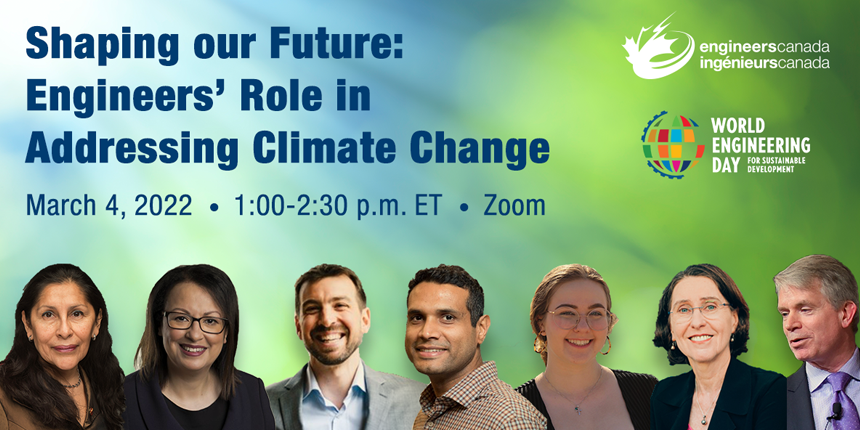

On March 4, 2022, World Engineering Day for Sustainable Development, Engineers Canada hosted a panel discussion entitled Shaping our Future: Engineers’ Role in Addressing Climate Change.
Moderated by Engineers Canada’s Vice President of Corporate Affairs and Strategic Partnerships Jeanette Southwood, and with opening remarks from Senator Rosa Galvez, an engineer, the panel brought together leaders from the engineering community representing academia, regulators, the non-governmental sector, and engineering students:
- Harshan Radhakrishnan, Manager, Climate Change and Sustainability Initiatives at Engineers and Geoscientists BC, spoke about the actions that the BC engineering regulator is taking to protect the public from the effects of climate change, and what the regulator’s expectations are of licensed engineers in BC.
- John Gamble, CEO of the Association of Consulting Engineering Companies-Canada, spoke of ACEC’s expectation that consulting engineering firms must consider the climate’s effects on their work, and also their work’s effect on the climate. He also spoke of some of the challenges that engineers and engineering companies face in addressing climate change.
- Louise Millette, Professor, with the Department of Civil, Geological and Mining Engineering and Head of the Office of Sustainable Development at Polytechnique Montréal, spoke about how academic institutions prepare future engineers to address climate change.
- Boris Martin, CEO of Engineers Without Borders, took a global perspective and spoke to the need to achieve global solidarity and take on a shared purpose in order to fight the worldwide challenges presented by climate change.
- Shanleigh McKeown, President of the Canadian Federation of Engineering Students (CFES), spoke about the need for every engineering student—regardless of their engineering discipline—to take responsibility for and commit themselves to tackling climate change.
As we wrapped up a great discussion, the moderator left us with a few thoughts and calls to action:
First, as a profession, we need to acknowledge that the work of engineers significantly influences, both positively and negatively, our human contribution to climate change and that our ability to influence isn’t limited to engineers working directly in the field of sustainability. Engineering professionals from all backgrounds and sectors have the unique combination of technical and interpersonal skills that can be utilised to contribute to climate change solutions.
Second, how can you influence your clients, suppliers, colleagues, peers and others to make choices that work towards a more sustainable future?
And third, to support you in this exploration, she provided some resources:
- Sustainability in Practice Massive Open Online Course (also known as our Sustainability in Practice MOOC). The course is a collaboration between Engineers Canada and Polytechnique Montreal that will provide you with real life case studies illustrating practical applications of the 10 guidelines contained in Engineers Canada’s National guideline on sustainable development and environmental stewardship for professional engineers. The course also suggests tools to apply these guidelines in your professional practice. The next session starts on March 16th. Here is a link: https://catalogue.edulib.org/en/cours/polymtl-sdes101/
- Public Infrastructure Engineering Vulnerability Committee Program that was developed by Engineers Canada with support and collaboration from the federal government and is now being administered by the Institute for Catastrophic Loss Reduction (ICLR). In addition, Engineers Canada developed the Infrastructure Resilience Professional Program which is now being led by the Climate Risk Institute. Here is a link to this program: https://climateriskinstitute.ca/2021/05/21/irp-credentialling-program/
The panel discussion was followed by questions from the audience for the panellists. The recording of the panel discussion and the questions and answers session is now available here:


